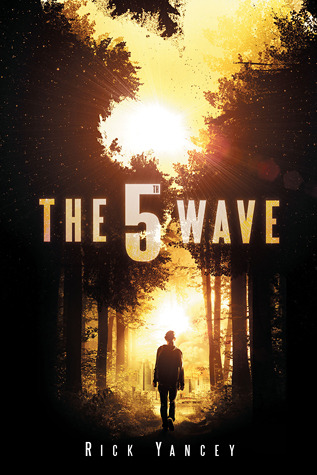I haven’t written a book review in this blog for months. One reason, obviously, is that I haven’t read a book in months, but that’s not strictly true. I’ve read a few for professional reasons that I just don’t want to review. And I haven’t been able to work up the energy to review Rick Yancey’s YA alien invasion epic The 5th Wave.
I’m not quite sure why I haven’t been able to work up the energy, because it was one of the two best books I’ve read this year. That may sound like faint praise, but when the other book was Gillian Flynn’s stunning Gone Girl, it’s actually something of a compliment. I think the real reason I don’t have the energy to review The 5th Wave is that I liked it so much that I deliberately stretched out my reading of it to the point that by the time I reached the end, I couldn’t remember all the great things I’d planned to say about it at the beginning. So if this review, which I’m finally writing several months after I finished the book, seems a bit sketchy, it’s because I’ve forgotten most of what I loved about it.
But not all. One thing I loved was that Yancey has a gift for writing poetic prose that doesn’t come across as the slightest bit poetic unless you’re looking very closely, which is a terrific gift for a writer of YA novels, where the audience might be suspicious of any book that sounds like it might someday be assigned in English classes. And it also makes for terrific reading if you’re the sort of person like me who is intensely interested in the prose mechanics of a novel. It took me a while to realize that Yancey’s prose had an almost song-like cadence to it, while still sounding like the kind of writing one would expect from a science fiction thriller. His sentences are perfectly constructed. His paragraphs are perfectly constructed. And his chapters end with beautifully thought out buttons that will haunt you long after you’ve finished reading them. And all this will sneak up on you without you even noticing he’s done it.
He’s also gone out of his way to make the well-worn alien invasion tropes feel new again. It’s not that he does anything genuinely original here — I don’t think there’s a trick in this book that I haven’t seen in some other alien invasion novel — but he takes a whole bunch of tricks (the title tells you how many) and combines them into something unique. He gives away the book’s central surprise in the prologue, just to show that he doesn’t even have to surprise you with it to make it work. (It’s that the aliens arrive on earth by inserting their consciousnesses into the brains of unborn fetuses, where they will awaken in adolescence. And, no, I haven’t spoiled anything that you won’t know by page 2.) And then a fresh mothership full of aliens starts hitting us with one nasty attack after another, but I’ll let you discover what those are about by reading the book.
What I loved about it most, though, was the moral ambiguity of it all. The aliens in the book aren’t entirely evil. Even the worst of them are simply looking for a new world to live on and want to get rid of the previous occupants. The best of them…well, let’s just say that they can be as heroic as any of the humans.
The book follows two viewpoint characters, Cassie (for Cassiopeia) and Zombie (whose real name escapes me at the moment). Cassie is a teenage girl who lives alone in the woods, armed for bear, afraid of other people because she doesn’t know which ones are aliens in disguise — and you can probably imagine the ugly places a situation like that can lead. The other is part of a children’s army being trained to fight back against the aliens, because children seem to have survived the early attack waves in greater numbers than adults have. (There’s a reason for this, but it would be a spoiler to mention it.)
Most of the suspense and fascination of Yancey’s novel comes from the internal struggles of these characters, but he can write a great action scene too. Yet my favorite moments were mostly internal monologues. Which is odd, because I’ve been reading a lot of advice lately from writers and editors, including the late Elmore Leonard, saying that writers should avoid internal monologue because it bores readers, who are apparently frightened by long paragraphs without dialog. I’m beginning to wonder if there’s something wrong with the fact that I love it. But Yancey’s book has been on bestseller lists already, so there must be other readers like me who don’t subscribe to the Elmore Leonard school of all-dialog narration. (In fairness to Leonard, most of Yancey’s book is first-person internal monologue, so you can think of it as dialog addressed to the reader.)
The 5th Wave is the first book of a trilogy, so don’t be disappointed if all your questions aren’t answered in the end and all the bad situations aren’t resolved. Some major plot arcs are tied up, so that should be enough to keep you happy until Book Two comes out. And if you’re like me, you’ll be lined up to download that book to your e-reader the moment it’s available.
